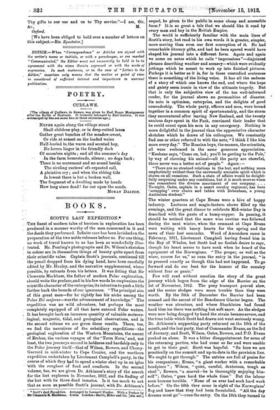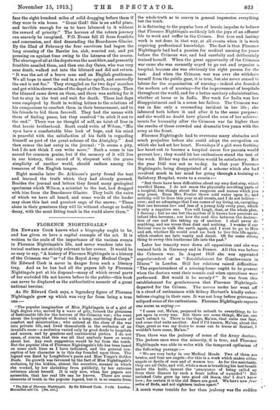BOOKS.
SCOTT'S LAST EXPEDITION.*
s• THE finest of.modern tales of heroism in exploration has been produced in a manner worthy of the men concerned in it and ,thedeeds they performed. Infinite care has been lavished on the preparation of the two-noble volumes before us. For one thing, no work of travel known to us has been so wonderfully illus- trated. Mr. Pouting's photographs and Dr. Wilson's sketches in colour are in themselves things of beauty quite apart from _their scientific value. Captain Scott's journals, continued till the pencil dropped from his dying band, have been carefully edited by Mr. Huxley, and the narrative supplemented, where possible, by extracts from his letters. It was fitting that Sir Clements Markham, the father of modern Polar exploration, should write the preface,and in his few words he emphasizes the scientific character of the enterprise, its intention to push a little farther back the bounds of our ignorance. " The principal aim of this great man—for he rightly has his niche among the Polar Da majores—was the advancement of knowledge." The expedition was no wild adventure, but perhaps the most
• completely equipped of all that have entered Polar waters.
I It has brought back an immense quantity of valuable meteoro-
. *gloat, magnetic, tidal, and geological observations, and in the second .volume we are given these results: There, too, . -we find, the narratives of the subsidiary expeditions—the
, geological exploration of the Western Mountains, the ascent of Erebus, the various voyages of the ' Terra Nova,' and, not least, the two journeys second in boldness and hardship only to the Polar journey itself—that of Wilson, Bowers, and Cherry- Garrard in mid-winter to Cape Crozier, and the northern expedition undertaken by Lieutenant Campbell's party, in the course of which they bad to spend a winter shut up in an igloo with the roughest of food and comforts. In the second volume, too, we are given Dr. Atkinson's story of the search for the lost explorers in November, 1912, and the finding of the but with its three dead inmates. Is it too much to ask that as soon Impossible Scott's journal, with Dr. Atkinson's • licetrs /As: Expedition. Arranged by Leonard Huxley. With a Preface by Sit amOnti ft, Markham. %took -London, Smith, Elder and Co. Da,net:]
sequel, be given to the public in. some cheap and accessible form P It is so great a tale that we should like it read by every man and boy in the British Empire.
The world is sufficiently familiar with the main lines of Scott's story, but read in his own words it is greater, simpler, more moving than even our first conception of it. He had remarkable literary gifts, and bad he been spared would have shaped his journal into a different form. Again and again we come on notes which he calls " impressions "—disjointed phrases describing weather and scenery—which were evidently jottings which he meant to work up into finished pictures. Perhaps it is better as it is, for in these unstudied sentences there is something of the living voice. It has all the sadness of a story of which one knows the end, and where the hope and gaiety seem ironic in view of the ultimate tragedy. But that is only the subjective view of the too well-informed reader, for the journal shows no _premonition of disaster.
Its note is optimism, enterprise, and the delights of good comradeship. The whole party, officers and men, were bound together in a common spirit of sportsmanship, and the storm they encountered after leaving New Zealand, and the twenty anxious days spent. in the Pack, convinced their leader that he could count upon his men in any emergency. Nothing is more delightful in the journal than the appreciative character sketches which he draws of his colleagues. We constantly find one or other referred to with the note, "I think I like him more every day." The Russian boys, the seamen, the scientists, all were embraced in the same generous appreciation. "Keohane says, ' Come on, lad ; you'll he getting to the Pole,' by way of cheering his animal—all the party are cheerful, there never was a better set of people." Again :—
" There are no strained relations in the hut, and nothing more emphatically evident than the universally amicable spirit which is shown on all occasions. Such a stake of affairs would be delight- fully surprising under any conditions, but it is much more so when one remembers the diverse assortment of our company. . . . To-night, Oates, captain in a smart cavalry regiment, has been 'scrapping' over chairs and tables with Debenham, a young Australian student."
The winter quarters at Cape Evans were a hive of happy industry. Lectures and magic-lantern shows filled up the evenings, and the great dinner to celebrate Mid-winter Day is described with the gusto of a bump-supper. In passing, it should be noticed that the same wise routine was followed during the next winter, when the remnant at Cape Evans were waiting with heavy hearts for the spring and the news of their lost comrades. Word of Amundsen came in February, 1911, Lieutenant Campbell having found him in the Bay of Whales, but Scott had no foolish desire to rap, though his heart seems to have sunk when he heard of the equipment of the Norwegians. " The proper, as well as the wiser, course for us," so runs the entry in the journal, " is to proceed exactly as though this had not happened. To go forward and do our best for the honour of the country without fear or panic."
Few will read without emotion the story of the great journey which begun from the edge of the Barrier on the 1st of November, 1912. The pony transport proved slow, and the motor sledges were more trouble than they were worth. By the 10th of December the Barrier bad been crossed and the ascent of the Beardmore Glacier begun. The weather was atrocious, and where Shackleton had found hard blue ice there was nothing but soft snow. As the sledges were now being dragged by band the strain became severe, and the time table which Scott bad drawn out went seriously wrong. Dr. Atkinson's supporting party returned on the 18th of the month, and the last party, that of Commander Evans, on the 3rd of January, and Scott, Wilson, Oates, Bowers, and P.O. Evans pushed on alone. It was a bitter disappointment for some of the returning parties, who had come so far and were unable to get to their goal. Scott was hopeful. "So here we are practically on the summit and up-to-date in the provisicn line.
We ought to get through." The entries are full of praise for his companions ; Evans, "a giant worker with a remarkable headpiece " ; Wilson, _ " quiet, careful, dexterous, tough as steel"; Bowers, "a marvel—he is thoroughly enjoying him- self "; Oates, "goes hard the whole time." But the labour soon became terrible. "None of us aver had such hard work before." On the 16th they came in sight of the Norwegians' flag and knew that they had been forestalled,. "All the day dreams must go"—runs the entry. On the 18th they turned to
face the eight hundred miles of solid dragging before them if they were to win home. "Great God! this is an awful place, and terrible enough for us to have laboured to it without the reward of priority." The horrors of the return journey can scarcely be imagined. P.O. Evans fell ill from frostbite and concussion, and died descending the Beardmore Glacier. By the 22nd of February the four survivors bad begun the long crossing of the Barrier ice, siok, wearied out, and yet pressing on against time owing to the lateness of the season. The shortage of oil at the depots was the next blow, and presently frostbite assailed them, and then one day Oates, who was very near death, walked out into the blizzard and did not return. " It was the act of a brave man and an English gentleman. We all hope to meet the end in a similar spirit, and assuredly the end is not far." They struggled on for two days' marches and got within eleven miles of the depot at One Ton camp. Then the blizzard came down on them, and there was nothing for• it but to stay in the tent and wait for death. These last days were employed by Scott in writing letters to the relations of his companions to comfort them in their bereavement, and to his friends to bid them farewell. They had the means with them of finding peace, but they resolved " to stick it out to the end." There was no thought of self, no taint of fear in that heroic brotherhood. Scott could write of Wilson, "His eyes have a comfortable blue look of hope, and his mind is peaceful with the satisfaction of his faith in regarding himself as part of the great scheme of the Almighty." And then comes the last entry in the journal : "It seems a pity, but I do not think I can write more." Such a scene is too sacred for• common praise, but if the memory of it will live in our history, this record of it, eloquent with the grave simplicity of another world, should endure among the treasures of the English tongue.
Eight months later Dr. Atkinson's party found the tent and learned the truth which they bad already guessed. Besides the journal and letters they found many geological specimens which Wilson, a scientist to the last, had dragged with him from the Beardmore Glacier. They built the cairn of which we have all heard, and some words of the leader may close this last and greatest saga of the snows : " There alone in their greatness they will lie without change or bodily decay, with the most fitting tomb in the world above them."































































 Previous page
Previous page